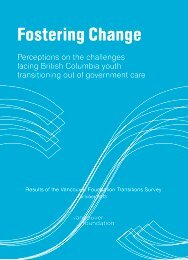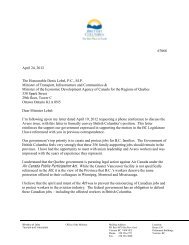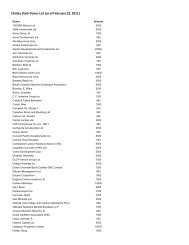How Smart Is ‘Power Smart’, BC Hydro’s Try at Saving Energy?Not very smart, says economist Mark Jaccard. But are we brave enough forCalifornia’s far more successful approach?By Christopher PollonArticle first published on March 9, 2011 by <strong>The</strong><strong>Tyee</strong>.ca.I recently joined BC Hydro’s Team Power Smart,joining <strong>the</strong> nearly 300,000 British Columbianswho have signed <strong>up</strong> to date. Months of saturationmarketing -- through TV, <strong>the</strong> Hydro Power SmartOlympic Village and pitches <strong>from</strong> ambassadors atscores of public events -- finally compelled me totake a closer look.A personalized online analysis of my townhouse andhydro bill revealed what I’ve known all along: I’m aglutton for power and need to change. My family hotwater tank is hemorrhaging energy, <strong>the</strong> crawlspaceneeds insulation, and my cursed electric baseboardheating will exact a horrible toll as utility rates rise by50 per cent over <strong>the</strong> next five years.By luring me to <strong>the</strong> Team, BC Hydro hopes to changemy consumption habits: not only do <strong>the</strong>y providepersonalized information on how to conserve, <strong>the</strong>ypromise to pay me $75 if I can reduce my electricalconsumption by 10 per cent in a year.That $75 carrot is a tiny piece of <strong>the</strong> $30 million BCHydro spent on its eight residential Power Smartprograms in 2010, which collectively saved <strong>the</strong> utilityan estimated 78 gigawatt hours (gWh) last year (seesidebar). This is a drop in <strong>the</strong> bucket when you considerthat BC Hydro produced more than 50,000 gWhof electricity in 2009 (including independent production),and is counting on conservation and energyefficiency to account for 66 per cent of its incrementalelectricity needs by 2020.Power hogs? Don’t offer <strong>the</strong>m rebates, says SFU’s Jaccard.Jack <strong>up</strong> <strong>the</strong>ir rates, and mandate efficient appliances.living pondering such things. I asked him about all <strong>the</strong>residential customer-focused rebates and cash incentives-- including cash to scrap old fridges, buy energyefficient appliances and replace incandescent lightbulbs.Was <strong>the</strong> cost of all that, I asked, a smart investment inconservation?Jaccard said my question was “coherent” but backwards.“If you have an objective like energy efficiency,why do you assume we have to spend moneyto achieve that? We should spend zero dollars. . .eliminate <strong>the</strong> Power Smart budget, and use electricitypricing and regulation instead.”So I approached Simon Fraser University environmentaleconomist Mark Jaccard, a man who makes a<strong>The</strong> erosion of conservation benefits60
When it comes to meeting our future electricity needs,BC Hydro has a few options: Increase system efficiency(“Resource Smart”), develop Site C, pay fornew s<strong>up</strong>ply via long-term contracts, or invest in conservation.Conservation is cheapest, and so BC Hydrowill continue to spend increasing amounts on demandside management (DSM) this decade. But <strong>the</strong> electricityyou avoid using still costs money.Jaccard is <strong>the</strong> co-author of an unpublished December2010 study that investigated whe<strong>the</strong>r <strong>the</strong> money spenton Canadian utility “subsidies” (like a rebate to buyan efficient appliance) actually works, and he says <strong>the</strong>news is not good. “DSM expenditures by Canadianelectric utilities have had only a marginal effect onelectricity sales,” <strong>the</strong> report concludes.Yet residential rebate programs remain popular withpoliticians, utility executives and <strong>the</strong> public, Jaccardsays, because <strong>the</strong>y make us all feel good about conservation.<strong>The</strong> only problem is that our energy consumptionkeeps growing in spite of <strong>the</strong>se measures,while utilities continue to oversell <strong>the</strong> benefits.Most utilities can only infer <strong>the</strong> impact of this spending.This is because many of <strong>the</strong> people who actuallyuse <strong>the</strong> rebates -- referred to as “free riders” -- are <strong>the</strong>same people who would buy <strong>the</strong> appliance in <strong>the</strong> absenceof <strong>the</strong> rebate. “Free riders add to <strong>the</strong> utility costof a subsidy program without contributing to its effectiveness,”says Jaccard’s report, which highlights a2004 U.S. study that estimated an “overall free ridershiprate of 50-90 percent,” based on a considerationof all utility DSM programs in all sectors.<strong>The</strong>n <strong>the</strong>re is <strong>the</strong> “rebound effect” -- when <strong>the</strong> improvedenergy efficiency of a given appliance, technology,etc. reduces <strong>the</strong> cost of using that device to<strong>the</strong> point that it actually spurs greater energy use. Soour lives are filled with increasingly energy-efficientdevices, but we have many more of <strong>the</strong>m, consumingever-greater amounts of electricity.Jaccard’s prescriptionMoney would be better spent, says Jaccard, focusingour efforts on “radical rate design” and regulationsthat force manufacturers to build efficiency into <strong>the</strong>irproducts.BC Hydro has already moved to what are called ConservationRates -- most of us now pay two separateprices for electricity -- a lower rate for a set period oftime, followed by a second, more expensive rate thatkicks in after a set period of consumption.Jaccard says <strong>the</strong> setting of that higher rate by BCHydro has been too conservative. This “top step”rate needs to go way <strong>up</strong>, and reflect <strong>the</strong> full costs ofbringing new s<strong>up</strong>ply online; this could see <strong>the</strong> highestrate moving into <strong>the</strong> 12-15 cents/kWh range. (Onmy February 2011 residential BC Hydro bill, <strong>the</strong> firstand second steps were 6.2 cents and 8.7 cents/kWhrespectively).On <strong>the</strong> subject of standards and regulations, Jaccardsays BC Hydro has made progress here too. A case inpoint is <strong>the</strong> new lighting efficiency standards that willsee <strong>the</strong> phase-out of incandescent light bulbs.“[BC Hydro] has started to realize that it’s better togive <strong>the</strong> money to encourage manufacturers or retailersin a certain direction, ra<strong>the</strong>r than final customers,”says Jaccard.<strong>The</strong>y’re doing it in CaliforniaCalifornia leads <strong>the</strong> way in North America when itcomes to <strong>the</strong> types of regulations and “standards” Jaccardrefers to. Since <strong>the</strong>y emerged in <strong>the</strong> early 1970s,<strong>the</strong> state’s building and appliance efficiency standardshave made California <strong>the</strong> most energy efficient state.“Our per capita energy consumption has been absolutelyflat for nearly 40 years, and this is directlybecause of <strong>the</strong>se standards,” says Adam Gottlieb,spokesperson for <strong>the</strong> California Energy Commission,<strong>the</strong> state’s primary energy policy and planning agency.He says standards for everything <strong>from</strong> air conditionersto fridges have enabled Californians to consume anaverage 7,400 kWh of electricity annually while <strong>the</strong>rest of <strong>the</strong> country averages at 12,000. (Note: a typicalBC household -- 1,600 square feet, not reliant onelectricity for space or water heating -- currently usesabout 14,000 kWh.)California’s utilities -- a broad mix of public andprivately-owned concerns, reliant on everything <strong>from</strong>imported coal power and hydro, to locally-generatedpower <strong>from</strong> natural gas and nuclear -- still spend a61








